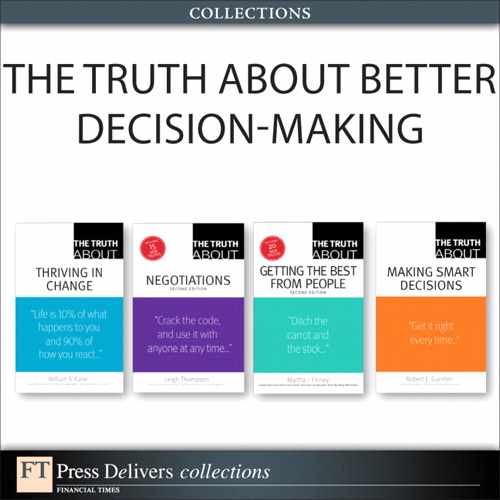Truth 35. Building trust
Trust in a negotiation is like lubricant in a car engine: Things go a lot more smoothly in its presence. Three types of trust operate in our relationships:
▪ Deterrence-based trust
▪ Knowledge-based trust
▪ Identification-based trust
Deterrence-based trust is based on the principle of carrots and sticks. If I want you to work for me, I might give you an incentive to complete a contracting job by offering you a bonus for finishing before schedule. (I offer you a carrot.) I might also have a penalty clause. (If you fail to finish the job by a certain date, I reduce the payment.) Deterrence-based trust is often based on contracts and monitoring. For example, if I hire you to work for me as a childcare provider, and I install a hidden video camera to monitor your behavior, this is a form of deterrence-based trust.
Deterrence-based trust is fairly expensive to use. (Think about the costs of the video camera and attorney’s fees!) The other problem is that if you get wind that I am monitoring you, you might be upset. For example, the presence of signs reading “Do not write on these walls under any circumstances” actually increases incidences of vandalism as compared to signs that say “Please do not write on these walls” or having no sign at all!23
For these reasons, many people in the business world use a different form of trust, known as knowledge-based trust. Knowledge-based trust is what is commonly referred to as a “gentleman’s agreement” or “handshake understanding.” Knowledge-based trust is trust that develops between people who have worked with each other long enough to feel that they know the other person and understand them and can predict their behavior. To be sure, knowledge-based agreements are not binding in a court of law, but they often have a binding effect on the people who make these agreements.
Knowledge-based agreements are not binding in a court of law, but they often have a binding effect on the people who make these agreements.
Most people prefer to work with people who are referred to them by a friend or colleague. Suppliers who regularly negotiate with certain customers are working on the basis of knowledge-based trust. For example, buyers and sellers post scores on Amazon.com, and freelancers and clients also score one another on freelancer.com. Interestingly, the diamond market in New York is based on knowledge-based trust. Knowledge-based trust is based on the fact that you and I are in a community in which we both have reputations and we both want to maintain our reputation.
Identification-based trust is based on the fact that we have aligned incentives. In identification-based trust systems, we have mutual empathy for each other.
If knowledge-based trust is based upon my knowledge of you, identification-based trust is based on the fact that we have aligned incentives. In identification-based trust systems, we have mutual empathy for each other. Identification-based trust means that other people have your value system—shared interests, values, and reactions to jointly experienced stimuli. For example, “You and I have the same high work ethic that comes from growing up where we did and putting ourselves through college.” You should do your homework to find such commonalities and be sure to emphasize them. It is far easier to trust someone you feel is on the same page as you in life than to trust someone who is very different.
